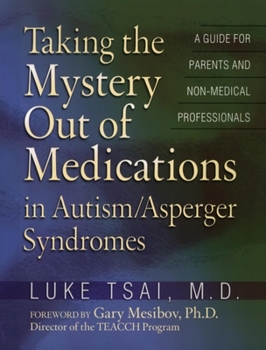Taking the Mystery Out of Medications in Autism/Asperger's Syndromes
Although medication should always be a last resort, many people on the autism spectrum claim that medication has improved their lives significantly. But how can a parent decide which meds to choose or... This description may be from another edition of this product.
Format:Paperback
Language:English
ISBN:1885477805
ISBN13:9781885477804
Release Date:October 2001
Publisher:Future Horizons
Length:440 Pages
Weight:2.35 lbs.
Dimensions:1.0" x 8.5" x 11.0"
Customer Reviews
3 ratings
Good book on meds
Published by Thriftbooks.com User , 19 years ago
This book was recommended to me by a behaviorist. It is definitely a requirement if you are considering putting your spectrum child on medication. It is pretty easy to read and the medications are divided by type. It is a good reference to have on hand, especially at doctor's appointments.
A Good Balanced Approach
Published by Thriftbooks.com User , 19 years ago
I have really appreciated the author's approach to this subject. Dr. Tsai does not appear biased in either direction when it comes to using medications to manage the complex moods and behaviors that can accompany autism spectrum disorders, but instead presents facts about the use of psychotropic and other medications, and how they may affect the austistic brain. Dr. Tsai allows readers to draw their own conclusions about how effective a drug may or may not be. In addition, this book includes a great primer on the way medications work in the human body. It will be a standard work for us when doctors suggest or prescribe medications for our autistic child.
Very comprehensive guide to autism medications
Published by Thriftbooks.com User , 22 years ago
Luke Tsai has provided a very comprehensive, yet concise and readable guide to medications used to treat autism. The book clearly acknowledges limitations of medications and its potential for misuse and goes on to discuss clearly where particular types of medications may be useful. Parents and individuals with autism in particular need to be informed about medications since general practitioners and psychiatrists specializing in areas other than the autistic spectrum are often not well informed about the medical needs of those on the spectrum (e.g., in many cases, individuals with autism will respond to relatively doses of medications much lower than those needed to be effective in the general population).The book is very well organized and contains a great deal readily accessible information. Tradeoffs and the role of medications in treatment are discussed along with the issue of comorbidity--the tendency of autism to coexist with other conditions--is discussed. Subsequently, medications that may be useful in different situations are discussed. For those interested, an appendix discussing the "big picture" of psychopharmacology is available. Another appendix summarizes uses, dosages, and administation of specific medications. The book does mention a number of technical terms so that the reader will be familiar with those as they crop up in other reading, but the book is genuinely readable and a very nice balance has been struck between comprehensiveness and conciseness. The book certainly lives up to its title in demystifying autism medications!






